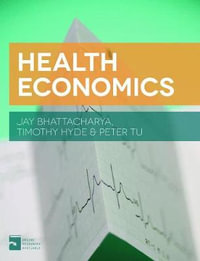
The Oxford Handbook of the Social Science of Obesity
By: John Cawley (Editor)
Paperback | 24 April 2014
At a Glance
Paperback
RRP $119.95
$75.50
37%OFF
Aims to ship in 5 to 10 business days
When will this arrive by?
Enter delivery postcode to estimate
The first section of the book explains how each social science discipline models human behavior (in particular, diet and physical activity), and summarizes the major research literatures on obesity in that discipline. The second section provides important practical information for researchers, including a guide to publicly available social science data on obesity and an overview of the challenges to causal inference in obesity research. The third part of the book synthesizes social science research on specific causes and correlates of obesity, such as food advertising, food prices, and peers. The fourth section summarizes social science research on the consequences of obesity, such as lower wages, job absenteeism, and discrimination. The fifth and final section reviews the social science literature on obesity treatment and prevention, such as food taxes, school-based interventions, and medical treatments such as anti-obesity drugs and bariatric surgery.
Industry Reviews
ISBN: 9780199359974
ISBN-10: 0199359970
Series: Oxford Handbooks
Published: 24th April 2014
Format: Paperback
Language: English
Number of Pages: 912
Audience: Professional and Scholarly
Publisher: Oxford University Press USA
Country of Publication: GB
Dimensions (cm): 17.2 x 24.5 x 4.0
Weight (kg): 1.47
Shipping
| Standard Shipping | Express Shipping | |
|---|---|---|
| Metro postcodes: | $9.99 | $14.95 |
| Regional postcodes: | $9.99 | $14.95 |
| Rural postcodes: | $9.99 | $14.95 |
How to return your order
At Booktopia, we offer hassle-free returns in accordance with our returns policy. If you wish to return an item, please get in touch with Booktopia Customer Care.
Additional postage charges may be applicable.
Defective items
If there is a problem with any of the items received for your order then the Booktopia Customer Care team is ready to assist you.
For more info please visit our Help Centre.
You Can Find This Book In
This product is categorised by
- Non-FictionMedicineMedicine in GeneralHealth Systems & Services
- Non-FictionBusiness & ManagementBusiness Strategy
- Non-FictionMedicineMedicine in GeneralPublic Health & Preventive MedicinePersonal & Public Health / Health EducationDietetics & Nutrition
- Non-FictionSociology & AnthropologySociology
- Non-FictionMedicineOther Branches of MedicineTherapy & TherapeuticsObesity Treatment & Therapy
- Non-FictionMedicineMedicine in GeneralMedical Sociology
- Non-FictionEconomicsHealth Economics
- Non-FictionFamily & HealthHome Nursing & Caring
- Non-FictionSociety & CultureCultural StudiesFood & Society
- Non-FictionEconomicsEconomic Theory & Philosophy























